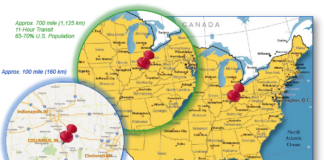“In just a quarter century, Alabama’s auto industry has gone from zero to 100 mph, and I know that our five global automakers will continue to invest in their operations in the state to fully realize their potential,” said Greg Canfield, Secretary of the Alabama Department of Commerce. “There is serious horsepower here, and I think our auto industry is just getting started in this new age.”
Altogether, Alabama’s five global automakers—Mercedes, Hyundai, Honda and Toyota, and Mazda—have invested over $13 billion in their operations in the state. That’s a testament to the success they have found in Alabama, and to their confidence in the workforces they have assembled in the state.
With the next chapter of the industry’s future fast approaching, it’s obvious that Alabama’s auto industry remains a dynamic growth engine for the state’s economy. Consider the powerful impact of the Mazda Toyota Manufacturing joint venture assembly plant in Huntsville, which recently began producing an all-new SUV for each of the automakers.
This $2.3 billion facility is not only bringing up to 4,000 direct jobs to Alabama but also generating strong economic ripples. More than a dozen Mazda Toyota suppliers, logistics firms, and support companies have established locations in Alabama, creating over 2,000 new auto-sector jobs. Combined, this supply-chain investment exceeds $725 million. The seamless launch of Mazda Toyota Manufacturing shows that Alabama’s auto industry is ready for new challenges—and for whatever the future holds.
Visit www.madeinalabama.com for more information.
Arkansas: The Right Stuff For The Automotive Industry
Automotive manufacturers looking for their next location will find a welcoming business environment in Arkansas. In addition to the low cost of doing business and a friendly regulatory climate, Arkansas provides a range of advantages for automotive manufacturing companies.
Arkansas provides a central U.S. location with proximity to multiple interstates and major waterways, has a burgeoning metals industry that is already supplying materials for auto manufacturers, and has existing automotive suppliers located throughout the state.

Arkansas is centrally located in the United States, offering a market of 100 million people—about 40% of the U.S. population—within a 550-mile radius of the state. Arkansas is also well-positioned for intercontinental commerce, being located midway between Mexico City and Montreal.
Manufacturers will benefit from Arkansas’ strong infrastructure advantages, including four Mississippi River terminals and three ports along the Arkansas River; multiple commercial airports, including the Bill and Hillary Clinton National Airport in Little Rock, Northwest Arkansas National Airport in Bentonville, and six regional airports, along with close proximity to Memphis International Airport; and three Class 1 railroads with 1,683 miles of rail. Three interstates—I-30, I-40, and I-55—run through Arkansas, connecting the state to markets in all directions.
Automotive manufacturers will benefit from Arkansas’ robust steel industry. The metals industry in Arkansas is thriving, particularly in the northeastern corner of the state, which is home to a Nucor steel mill and the Big River Steel mill, owned by U.S. Steel, as well as a soon-to-be-built mill. In January 2022, U.S. Steel announced its plans to build a new facility—the most technologically advanced mill in North America—in Arkansas. This $3 billion investment, which will create 900 plant jobs, is the largest capital investment in Arkansas history.
“This puts us in a better position to say to the automobile industry, ‘Locate in Arkansas. Put your next manufacturing facility here. Look at the steel that we’re producing, how close you would be to this production of steel in our state,’” said Governor Asa Hutchinson.















![[VIDEO] Get More for Your Business in Ardmore. Oklahoma](https://businessfacilities.com/wp-content/uploads/2024/02/maxresdefault-324x160.jpg)
